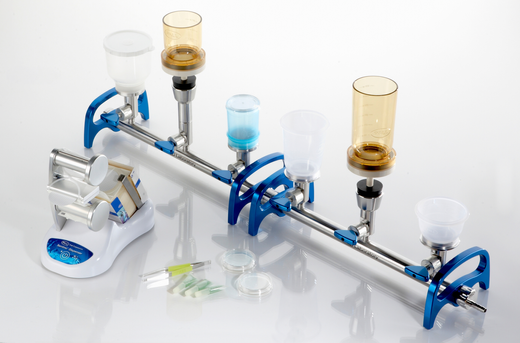DESCRIPTION
Laboratory manifold, a Pall Life Sciences product, allows you to optimize testing without sacrificing cleanliness with interchangeable components and coupling devices.
No more “dirty” manifolds: Microbial cross contamination of your sample is a thing of the past. The manifold is designed to fit most laboratory autoclaves by separating into manageable components.
Double testing Capacity: A larger manifold is at your reach with just a coupler. Modular design allows two manifolds to combine yielding a standard 6-place manifold which can be easily separated for disinfection and/or sterilization.
Manifolds that adapt to you: Whether you are right or left handed, setting up your test workflow is second nature. The components interchangeable and designed with a simple slip fit to the manifold.
Regulatory
“For filtration, mount receptacle of filter holding assembly on a …suitable device (manifold to hold three to six filter assemblies) such that a pressure differential (34 kPa to 51 kPa) can be exerted on the filter membrane.”
- Standard Methods for the Examination of Water and Wastewater, 22nd Edition, 9222B (f).
Applications
Bioburden testing of filterable products is performed to determine the number of viable and reproducible microorganisms. By recovering organisms on and in a membrane filter, processing efficiency and the microbial quality of a sample can be evaluated to assure that the product is not harmful to the intended recipient.
Detecting spoilage microorganisms are critical for foods and beverages as they may be responsible for the deterioration of sensory qualities (visual, texture, and taste) and may potentially render the product harmful for consumption. Using membrane filtration, detection of these spoilage microorganisms keep contaminated items from reaching the market.
Monitoring for compliance to drinking water standards using Membrane Filtration Technique, determines if there are levels of pathogenic microorganisms in treated water or wastewater. These microorganisms include coliforms such as Escherichia coli (E. coli) and Legionella which are both classified as pathogens.
 +852-3069 6950
+852-3069 6950 css@gugent.com.hk
css@gugent.com.hk

